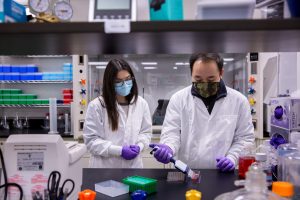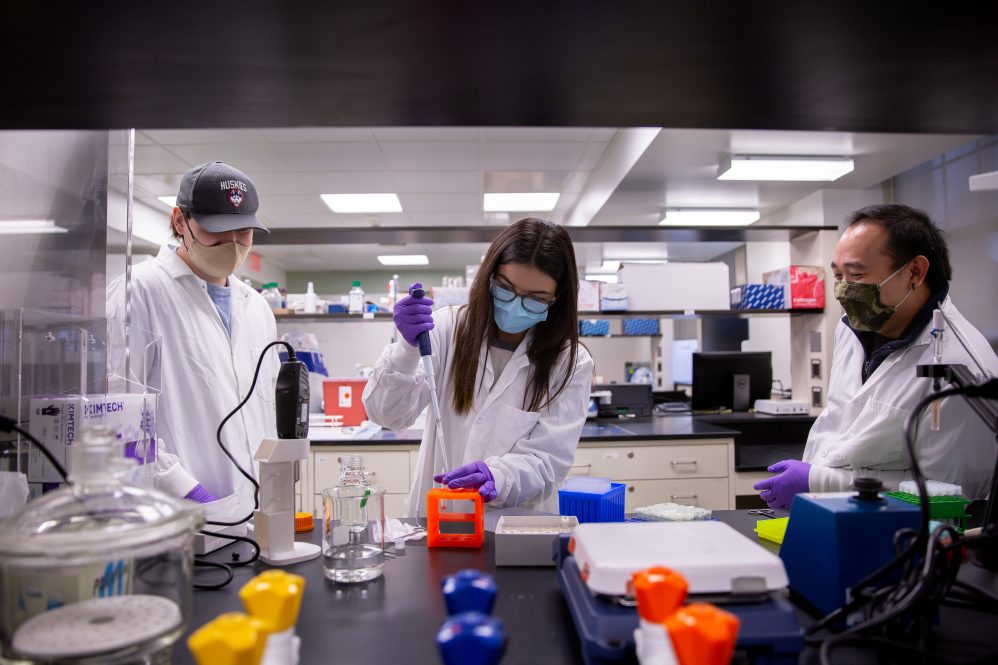UConn School of Nursing faculty Steven Kinsey, Ph.D., is the first researcher in nursing to win the International Cannabinoid Research Society Mid-Career Award.
The International Cannabinoid Research Society (ICRS) – established in 1990 – is a scientific association committed to fostering cannabinoid research, promoting the exchange of scientific information, and serving as a reliable source of information on the effects of cannabis and its constituents. ICRS is comprised of over 650 members representing over 40 countries who are all active researchers in the cannabinoid field.

The Mid-Career Award is given to someone within 10 to 30 years of receiving their terminal degree. The recipient must have demonstrated a dedication to cannabinoid/endocannabinoid research, developed a research program in the field, have a strong publication record, and must show promise in the research field. To be considered, a member must be nominated by one or more other members, and winners are decided by vote of the Awards Committee.
“Dr. Kinsey won this award because his research accomplishments have played a pivotal contribution to cannabinoid research, he has had tremendous impact on training the next generation of scientists in the cannabinoid field, and he has emerged as a leader in the cannabinoid field,” wrote Aron Lichtman, Ph.D., a professor of Pharmacology and Toxicology at Virginia Commonwealth University, who nominated Kinsey for the award. “Dr. Kinsey’s impact on scientific research extends into service and leadership at his home institution, as well as throughout the US and the international community.”
Kinsey was first elected to the ICRS board over 12 years ago, serving as secretary, treasurer, and now, executive director. This coming December will be his sixth year with the UConn School of Nursing as a professor and researcher. On campus, you can find the Kinsey Lab, where Kinsey and his students study cannabinoid and opioid systems, contributing to his 20 years of research.
His research specifically focuses on how cannabinoids can assist in relieving pain and addiction. Cannabinoids are cannabis-like chemicals that can come from the cannabis plant and be produced within our own bodies. They can decrease inflammation, decrease our ability to process pain in the brain, and they don’t have the same abuse potential as opioids.
“We have evolved to use our own endogenous cannabinoids and they have all these different functions that we’re still not fully aware of, but a lot of them have to do with making you hungry, helping you sleep, reducing stress, and that’s been a lot of my work over the years, tapping into our brain’s own cannabinoids and trying to dial those up or down to help modulate pain and inflammation,” Kinsey said.

While there are a lot of different cannabis products, the underlying research and scientific knowledge about them is minimal. Kinsey’s contributions to the field involve looking at the different cannabis plant chemicals and figuring out their biological effects.
Different models of pain, like itch, and the dependency of opioids are also a part of Kinsey’s research. The effects that opioids can have are a main reason why Kinsey continues to examine cannabinoids.
“There are so many people in my family who have different pain conditions and friends as well with a lot of neuropathic pain or low back pain, and there’s just not a lot of good treatments out there,” he said. “The opioids work well in the short term, but they obviously have a lot of bigger problems such as dependence and addiction. I have been inspired by individuals that I know to help find better solutions.”
A few years ago, Kinsey’s father was going through palliative care. He lived in California, which Kinsey explained, had a lot of recreational and medicinal cannabis use at the time. Despite having worked in the field for so long, he was at a loss for what to tell his father.
“It was tough because I felt like I didn’t have better advice to give him than what he was reading on the internet, because there’s just so little clinical trial data out there,” Kinsey said.
Having received the ICRS Mid-Career Award, Kinsey feels supported to continue his research in cannabinoids so individuals, like his father, have a better understanding of the effects cannabis and cannabinoids can cause on human physiology.
Kinsey said receiving the award was and still is surreal. While he is forever grateful for his mentors and colleagues, he is especially appreciative of his students, who got to be there with him when it was announced that he had won.
“To be able to have people read what you’ve written and endorse it is very encouraging. It was surprisingly validating to hear that I was seen at that level with them, because I really admire them,” said Kinsey. “But I was really struck by my students and how hard they have worked all these years on all these various projects that we have done.”



